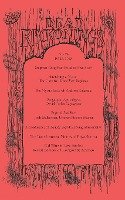TABLE OF CONTENTS A Feast in Small Bites ........... Géza A. G. ReillyRobert Aickman, Compulsory Games Alive with Darkness ........... S. T. JoshiRamsey Campbell, By the Light of My Skull and The Way of the Worm God Is a Disease: The Mystic Exile of Andrzej Zulawski's Possession ........... Nathan Chazan Full House ........... Hank WagnerDarrell Schweitzer, The Dragon House Ringing in Apocalypse ........... Christopher RopesDavid Peak, Corpsepaint Reflections on ICFA ........... J. T. Glover Ramsey's Rant: A Modicum of Blood ........... Ramsey Campbell What Is Anything When Considered Twice?Existential Remembrance ........... Donald Sidney-FryerAll He Cared to Tell ........... Géza A. G. ReillyS. T. Joshi, What is Anything?: Memoirs of a Life in Lovecraft The Case for Weird Tales Replicas ........... Ryne Davis Transformative Visions ........... Acep HalePriya Sharma, All the Fabulous Beasts A Visionary Work Renew'd ........... Sam Gafford and The joey ZoneWilliam Hope Hodgson, The House on the Borderland, illustrated by John Coulthart Adam Nevill: The Sense of Dread ........... S. T. Joshi Horrifying Abnormality of the Mundane ........... Fiona Maeve GeistTim Waggoner, Dark and Distant Voices: A Story Collection Stephen King: Fast Food or Five Star? ........... James Arthur Anderson Signs of a Young Horror Master ........... Leigh BlackmoreJosh Malerman, Goblin: A Novel in Six Novellas When Unreality Becomes Too Unreal ........... Darrell SchweitzerJosh Malerman, Unbury Carol The Beauty and Horror of Home ........... Javier MartinezAndrew Michael Hurley, Devil's Day Realities Other Than the Ordinary ........... Peter Cannon Henry Wessells, A Conversation larger than the Universe:Readings in Science Fiction and the Fantastic 1762-2017 About the Contributors

